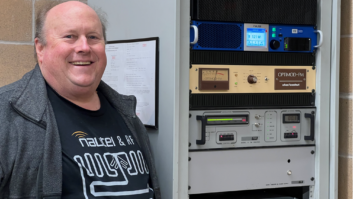REC Networks this week filed comments with the FCC regarding a petition for rulemaking that could have a negative effect on some low-power FM stations.
The Petition for Rulemaking (RM-11786) was filed by the owner of an FM translator in Philadelphia seeking to modify current FCC rules in order to protect fill-in FM translators against interference complaints from distant full-power radio stations.
Aztec Capital Partners Inc. is seeking a “rebalancing of the equities in the FM translator rules” so that radio service provided by fill-in translators is not “forestalled or removed by distant radio stations far outside” a local radio market.
LPFM proponent REC Networks says it is introducing “what could be seen as a counterproposal to the petition” filed by Aztec supporting protections for LPFM and smaller AM stations with translators.
Michi Bradley, founder of REC Networks, detailed to Radio World what the organization supports in the petition, including portions as they relate protections for Class C and D AM stations with FM translators within the 25-mile radius or outside if the translator reaches the city of license. “REC’s focus is always on the community of license,” she says.
She also supports adding additional protections to the 1990 “vintage interference criteria” in Sections 74.1203 and 73.1204 of the current FM translator rules to LPFM stations from new and modified translators, similar to protections already given to Class D (secondary) stations [the original LPFM], Bradley said.
Aztec Capital Partners requested the FCC to consider a rulemaking to modify those two sections of the rules so that interference complaints by distant full-power radio stations against a fill-in translator from outside a local radio market cannot result in translator being removed from the air.
“We are not proposing to change the contour overlap rules for translators,” Bradley wrote in a response to Radio World’s questions.
REC Networks believes the Aztec Capital proposal “limits the ability” of an LPFM station to seek remediation for predicted or actual interference by a new FM translator, especially in cases where terrain would result in a translator’s signal being heard well in excess” of its predicted contours.
“It is REC’s conclusion that the petition would only have a slightly moderate adverse effect to LPFM to the extent that it would allow a translator to use a channel that would be otherwise not be available due to a nearby full-service FM station complaining but could also be in some rare cases where a translator can be ‘wedged in’ between a full-service FM station and an LPFM station that is spaced under §73.807(a) which also includes an additional 20-kilometer buffer zone which extends the theoretical protected contour of full-service FM station classes and the translator utilizes a directional antenna to maximize service between the two (LPFM and full-service) contours,” REC said in a summary of its views on the Aztec Capital petition.
But REC Networks also found the “proposal will have a major adverse effect to LPFM stations wishing to operate FM translators that are either licensed to the LPFM entity where there is slight contour overlap between the primary (LPFM) station and the translator or FM translators licensed to unrelated entities where the service contour of the translator does not overlap the service contour of the primary LPFM station, but the translator can still receive the LPFM station over the air, by not affording LPFM translators the same protections despite the fact that the LPFM may be also directing programming tailored for the translator’s service area and could in some cases be the only local radio service for the station served by the LPFM translator.”
Aztec Capital explained in its petition for rulemaking to the FCC it seeks to rebroadcast its Spanish language programming from WHAT(AM) on a fill-in translator at 92.1 MHz. However, a complaint lodged by Clear Communications Inc. alleges potential interference with their full-power Class A FM WVLT on the same frequency in southern New Jersey, which is approximately 50 miles away, according to the petitioner.
“Clear Communications is attempting to extend its signal into the Philadelphia metro area claiming listeners far outside its community of license and service area. These filings allege interference to at most several dozen purported distant listeners in the Philadelphia metro area,” Aztec Capital Partners wrote in its petition.
FM translators are considered secondary services and are typically forced to leave the air until interference complaints with full-time stations can be resolved.
The FCC is accepting comments on the Aztec Capital petition (RM-11786) until May 17.











